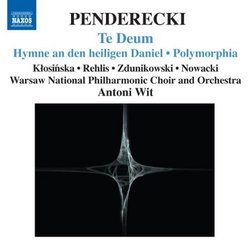Incredible CD -- amazing Polymorphia
Michael Suh | 11/22/2008
(5 out of 5 stars)
"Like all of Penderecki's music, everything here is very "serious." So if you're looking for a pick-me-up, don't look here. Even the Te Deum, which is supposed to be a hymn of praise, isn't exactly cheery.
Fortunately, even though the music is very solemn, it is all very well done. Like the St. Luke's Passion, the Polish accents of the choirs come through pretty thickly when they sing in Latin in the first 2 works, but the intonation of the singing and orchestra performances are top notch. So it's really not a big deal. Latin's a dead language -- how is it really supposed to sound, anyway? I usually don't consider his church works in general to be his strongest because they can get tedious, but these works' relative brevity especially when compared to his Passion and Requiem make them better than most.
I think the work that really steals the show here is Polymorphia. It has been featured in horror movies, and it does have a creepy feel to it at first -- meanacing rumbling in the lower strings, upper pizzicato, glissandi, col legno, and other unusual techniques. The whole work unfolds in waves and the different sections flow much better than in Threnody; Polymorphia struck me immediately as a masterpiece and is arguably Penderecki's finest work from his avant-garde period. It also doesn't hurt that the Warsaw Philharmonic sounds much more polished on this CD than the Katowice Radio Orchestra did on earlier CDs with other early works (Threnody, De Natura Sonoris II, Fluoresences). It is astounding to think he wrote this work at the age of 28.
The Chaconne for strings ends the disc. It's an addition to the Polish Requiem after Pope John Paul II died. It's pleasant enough and very richly scored (Penderecki truly plasters the "neo-Romantic" label on all his new works), but coming right after Polymorphia, it really sounds like an afterthought.
This is probably the best CD of Naxos's Penderecki set to date. Don't miss it!"
One of the best CDs in Naxos' Pendercki cycle
Vanilor | Colorado | 04/28/2008
(5 out of 5 stars)
"Penderecki's Te Deum was written in 1979, some 15 years after the St. Luke Passion, and just a year before the Polish Requiem. It greatly resembles the most exciting moments of the Polish Requiem, compacted into about 35 minutes. It is full of action, very interesting, and very exciting.
The other two major works on this CD are actually even better. The Hymne is stunningly beautiful, and Polymorphia, from Penderecki's early avant-garde period, is simply incredible in its chaos. It deserves to be just as well known as the Threnody for the Victims of Hiroshima."
A wonderful Penderecki sampler
Marius Cipolla | 05/31/2010
(5 out of 5 stars)
"Although the works on this CD are disparate, and from widely separated phases in the great composer's career, they were clearly chosen to provide a bouquet of Penderecki's most accessible shorter compositions.
The Te Deum is a magnificent example of Penderecki's liturgical music, full of power and glory. Secular listeners sometimes complain that Penderecki's religious music is "dark" and "not exactly cheery;" but it should be noted that for this deeply religious composer, being in the presence of God is not the sentimental glow of a religious card, but an experience filled with overwhelming, unearthly sensations of awe akin to terror.
This holds true for Polymorphia, which dates from the period when the composer declared, "I want to liberate sound beyond all tradition." This is a seminal work which everybody ought to listen to at least once in a concert hall, rather than as the backdrop to a horror film.
The beautiful Hymne opens other and more rarefied vistas, and the Chaconne is a seductive neoclassical work unlikely to challenge even the most conservative listener.
I think that many people are going to find this an excellent introduction to the thrilling, terrifying, sublime world of Penderecki. Nobody will regret buying it."

